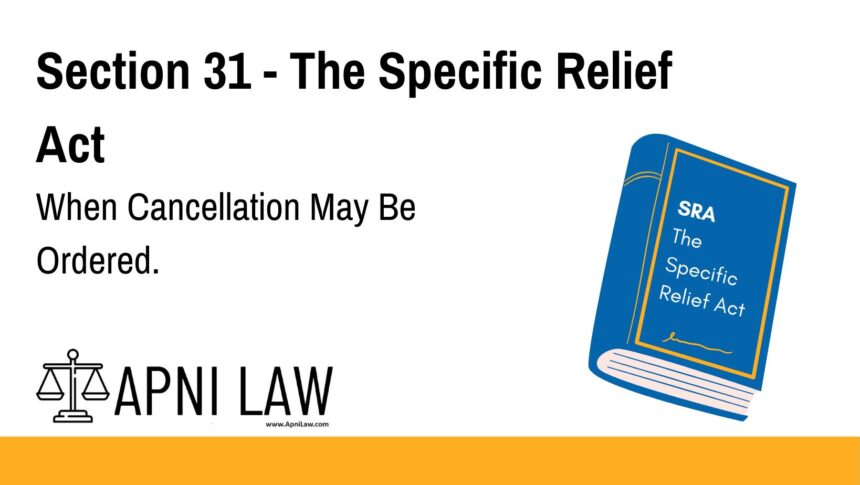Code: Section 31 – The Specific Relief Act
Section 31.
(1) Any person against whom a written instrument is void or voidable, and who has reasonable apprehension that such instrument, if left outstanding, may cause him serious injury, may sue to have it adjudged void or voidable; and the court may, in its discretion, so adjudge it and order it to be delivered up and cancelled.
(2) If the instrument has been registered under the Indian Registration Act, 1908 (16 of 1908), the court shall also send a copy of its decree to the officer in whose office the instrument has been so registered; and such officer shall note on the copy of the instrument contained in his books the fact of its cancellation.
Explanation of Section 31 – The Specific Relief Act
Overview
Section 31 of The Specific Relief Act provides a remedy for individuals who are affected by a void or voidable written instrument. It allows a person to seek the cancellation of such an instrument if they can demonstrate that its existence may cause them serious harm. This section provides a judicial remedy to ensure that a person is not unduly burdened by a document that has no legal effect or is capable of causing damage if left unaddressed.
Key Provisions
- Right to Sue for Cancellation: A person against whom a written instrument is void or voidable, and who faces a reasonable fear of harm from it, has the right to file a suit seeking its cancellation.
- Court’s Discretion: The court has the discretion to declare the instrument void or voidable and may order it to be delivered up and cancelled, thus rendering it ineffective and legally irrelevant.
- Effect of Cancellation on Registered Instruments: If the instrument has been registered under the Indian Registration Act, 1908, the court is required to send a copy of its decree to the registering authority. The officer will then make a note of the cancellation in the register, ensuring that the instrument’s cancellation is formally recorded.
Illustration
Example 1: Cancellation of a Voidable Agreement
A person enters into a contract that is later found to be voidable due to misrepresentation. The person who is harmed by the contract believes that, if left unresolved, the agreement could cause financial loss or legal complications. Therefore, they file a suit under Section 31 to have the contract declared void and cancelled by the court.
Example 2: Cancellation of a Fraudulent Document
A person who is a victim of a fraudulent deed of transfer, which was executed under duress, seeks the cancellation of the document to prevent it from being used to dispossess them of their property. Since the document is voidable and may cause serious injury, the court orders its cancellation.
Common Questions and Answers on Section 31 – The Specific Relief Act
1. Who can file a suit under Section 31 for cancellation of an instrument?
- Answer: Any person who is affected by a written instrument that is void or voidable and who has a reasonable apprehension that the instrument may cause them serious injury can file a suit under Section 31.
2. What does it mean for an instrument to be void or voidable?
- Answer: A void instrument is one that has no legal effect from the outset, while a voidable instrument is one that is valid until a party seeks to invalidate it, often due to issues like fraud, coercion, or misrepresentation.
3. Does the court have the power to cancel all written instruments?
- Answer: No, the court’s power to cancel is limited to written instruments that are either void or voidable and where the person seeking cancellation can demonstrate that its continued existence may cause serious harm.
4. What happens if the instrument is registered under the Indian Registration Act?
- Answer: If the instrument is registered under the Indian Registration Act, the court must send a copy of its cancellation decree to the registration officer. The officer will then record the cancellation in the register, ensuring that the cancellation is officially noted.
5. Can this provision apply to all types of written instruments?
- Answer: Yes, Section 31 applies to any written instrument that is void or voidable, such as contracts, deeds, or agreements, provided that the party seeking cancellation can demonstrate reasonable grounds for the suit.
Conclusion
Section 31 of The Specific Relief Act serves as an important remedy for individuals who are affected by void or voidable written instruments. It empowers courts to cancel such instruments to prevent harm or injury, ensuring fairness in the legal process. Furthermore, if the instrument is registered under the Indian Registration Act, the cancellation is officially recorded, providing further legal clarity.








